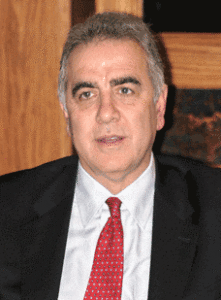
The Armenian National Committee of America, San Fernando Valley West chapter, held an all-day conference on March 17 on the occasion of the 30th anniversary of the Artsakh (Karabagh) liberation struggle. The conference was held at the Ferrahian Armenian High School in Encino, California. The speakers were: historian Garo Moumdjian, Ph.D, California Courier publisher Harut Sassounian, ANCA National Board Member Steven Dadaian, Esq., A.R.F. Western US Central Committee Member Levon Kirakosian, Esq., and A.R.F. Western US Central Committee Member Vache Thomassian, Esq.
Here are excerpts from Harut Sassounian’s remarks at the conference:
The United Nations Security Council adopted four Resolutions during the Artsakh (Karabagh) war in 1993 calling for the withdrawal of Armenian forces, cessation of all hostilities and urging a negotiated settlement of the conflict between Armenia and Azerbaijan.
These four Resolutions are often cited by the Azerbaijani media which is under the strict control of the government of Azerbaijan. In the past 25 years, the Azeris have repeatedly condemned Armenia for not abiding by these UN Security Council Resolutions, and have made them a part of their continued propaganda war against Armenia.
However, Azerbaijan has distorted the contents and context of these Resolutions, trying to deceive the international public opinion. Azerbaijan itself has not complied with these Resolutions. When one side (Azerbaijan) violates these Resolutions, it cannot accuse the other side (Armenia) of not complying with them.
The UN Security Council is composed of 15 States: Five of them are permanent members who have a veto power (United States, Russia, China, Great Britain, and France) and 10 of them are rotating members. The UN Security Council is charged with maintaining peace and security among nations. UN member states are obligated to carry out the decisions of the Security Council.
It is particularly hypocritical of the Turkish government to blame Armenia for not complying with the four UN Security Council Resolutions, when Turkey itself has violated over 60 UN Security Resolutions adopted since Turkey’s invasion of Northern Cyprus in 1974.
Let us now review each of the four UN Security Council Resolutions which were adopted unanimously by all 15 member states. I have added my comments in bold letters at the end of some of the clauses of these four Resolutions:
Excerpts from UN Security Council Resolution 822, adopted April 30, 1993:
“Demands the immediate cessation of all hostilities and hostile acts with a view to establishing a durable cease-fire, as well as immediate withdrawal of all occupying forces from the Kelbadjar district and other recently occupied areas of Azerbaijan.” Azerbaijan has violated the cease-fire for 25 years on a regular basis by continuously shooting across the borders of Artsakh and Armenia.
“Urges the parties concerned immediately to resume negotiations for the resolution of the conflict within the framework of the peace process of the Minsk Group of the Conference on Security and Cooperation in Europe and refrain from any action that will obstruct a peaceful solution of the problem.” The Minsk Group of CSCE, subsequently renamed OSCE, is composed of three co-chairs: the United States, France and Russia which are the official mediators to help resolve the Artsakh conflict, not the United Nations Security Council!
“Calls for unimpeded access for international humanitarian relief efforts in the region, in particular in all areas affected by the conflict in order to alleviate the suffering of the civilian population and reaffirms that all parties are bound to comply with the principles and rules of international humanitarian law.” Despite this clause, Azerbaijan has tried to undermine the delivery of international humanitarian aid to the people of Artsakh.
Excerpts from UN Security Council Resolution 853, adopted July 29, 1993:
“Expressing once again its grave concern at the displacement of large numbers of civilians in the Azerbaijani Republic and at the serious humanitarian emergency in the region.” The reference to “the serious humanitarian emergency in the region” also applies to Armenian refugees from Azerbaijan.
“Reaffirming the sovereignty and territorial integrity of the Azerbaijani Republic and all other States in the region.” This clause applies to both Armenia and Azerbaijan.
“Reaffirming also the inviolability of international borders and the inadmissibility of the use of force for the acquisition of territory.” Artsakh Armenians have the right to self-determination under international law and UN Protocols.
“Reiterates in the context of paragraphs 3 and 4 above its earlier calls for the restoration of economic, transport and energy links in the region.” This clause is violated by Azerbaijan and Turkey by their blockades of Armenia and Artsakh.
“Urges the parties concerned to refrain from any action that will obstruct a peaceful solution to the conflict, and pursue negotiations within the Minsk Group of the CSCE, as well as through direct contact between them, towards a final settlement.” The reference to “the parties concerned” and “direct contact between them,” implies Artsakh’s inclusion in the negotiations, as was the case earlier. Azerbaijan blocked Artsakh’s participation in the negotiations.
“Urges the Government of the Republic of Armenia to continue to exert its influence to achieve compliance by the Armenians of the Nagorny Karabakh region of the Azerbaijani Republic with its resolution 822 (1993) and the present resolution, and the acceptance by this party of the proposal of the Minsk Group of the CSCE.” Armenia coordinates its negotiating position with the government of the Republic of Artsakh. However, Artsakh’s exclusion from the negotiations makes the task of coordination more difficult. Furthermore, Artsakh not being a recognized state and not a member of the UN is under no obligation to comply with any of these Resolutions.
“Urges States to refrain from the supply of any weapons and munitions which might lead to the intensification of the conflict or the continued occupation of territory.” This clause is violated by Turkey, Russia, Israel, the Czech Republic, Ukraine, Pakistan, and several others, which have supplied billions of dollars of weaponry to Azerbaijan.
(Continued next week)






